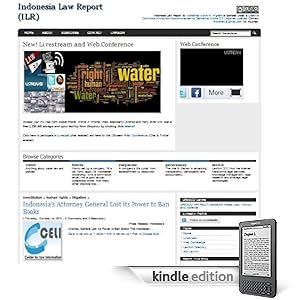Ed note: this is a guest post by Suria Nataadmadja (suria[at]surialaw.com) and Selviyani from SURIA NATAADMADJA & ASSOCIATES. If you have further inquiry on this topic, please contact the authors directly.
As a matter of clarity, the term foreign direct investment is used here to distinguish it from the investment made by acquiring the shares of an Indonesian company from the stock market. Foreign direct investment can also be done by acquiring the shares of an established foreign investment company. The effect of foreign direct investment is to ascertain the share holding of foreign investors in a limited liability company as regulated by Law Number 40 of 2007 regarding Limited Liability Company, promulgated on August 16, 2007 in State Gazette 2007 Number 106 (“Law 40/2007”), and Supplement to State Gazette Number 4756.
Foreign direct investment in Indonesia has started as early as 1967 and the government has changed the law to Law Number 25 of 2007 regarding Investment, promulgated on April 26, 2007 in State Gazette 2007 Number 67, and Supplement to State Gazette Number 4724 (“Law 25/2007”). This Law supersedes Law No.1 of 1967 regarding Foreign Investment, and Law No.6 of 1968 regarding Domestic Investment. Compared to the 1967 Law, the new legislation is more accommodating to foreign investors, addressing important issues such as land rights. A presidential decree number 36 of 2010 regarding List of Business Open and Closed with Restriction for Investment (“Negative Investment List”) updated Indonesia’s Negative Investment List of December 2007 as regulated by presidential decree Number 76 of 2007. The main purpose of the new Negative Investment List are to implement the Indonesian government’s commitment to the Association of Southeast Asian Nations/ASEAN Economic Community but nevertheless it will encourage foreign direct investments from other countries as well. Only direct investments either foreign or domestic will be affected by the Negative Investment List. Indirect investment through the stock market will be exempted from complying with this Negative Investment List.
Certain investment that is meeting the requirement as stipulated in article 18 of Law 25/2007, entitled to be given tax incentives i.e. Income tax reduction; Custom exemption to machineries, capital goods and tools; Custom exemption on raw materials; VAT exemption; Accelerated amortization and depreciation; and Incentive on land and building tax. The government also recently issued Government Regulations No.1 of 2007 regarding the Facility of Income Tax for Investment on Certain Business Sectors or Regions (January 2, 2007). The certain business sectors amongst others are: food processing industries, packaging industries, plastic goods industries, cement industries, furniture industries, seafood processing industries, etc. Furthermore, the Government also issued the following regulations e.g. Ministry of Finance No.16/PML/03/2007 regarding Granting Income Tax Facilities for Investment on Certain Business Sectors or Certain Regions, Directorate General of Tax No. Per 67/PJ/07 of 2007 regarding Procedure of Granting Income Tax for Investment on Certain Business Sectors and/or Certain Regions.
Investments in Indonesia are coordinated by the Investment Coordination Board or Badan Koordinasi Penanaman Modal (“BKPM”); a nongovernmental department board leads by Head of BKPM, a position of ministerial level. BKPM’s policy has a very simple guidelines, forms, and requirements for filling applications of investment licenses as regulated by Decree of Head of BKPM Number 57/SK/2004 and Number 70/SK/2004. Latest regulation issued by BKPM is regulation No. 12 of 2009 regarding Guidelines and Procedures Application of December 23, 2009, that replaced the previous BKPM regulations on the guidelines and procedures for investment applications under domestic and foreign Investments. The latest regulation is sufficiently clear and self explanatory whereas it is attached with the necessary forms and guidance which are provided in Indonesian and English.
In practice, the process from the application to BKPM approval will take approximately between 3 weeks to 3 months. The most time consuming process is to translate foreign company documents to English, the language accepted by BKPM, and communicating Indonesian regulations to the foreign investors.
The approval from BKPM shall be followed by limited liability company establishment which for the foreign investment company shall be in form of a limited liability company under the foreign investment scheme (usually called “PT. PMA”). PT. PMA shall be formed by at least two share holders in form of a civil law notary’s deed (paragraph 1 article 7 Law 40/2007). Then, the deed shall obtain a statutory body status from the Minister of Law and Human Rights (paragraph 4 article 7 Law 40/2007) and published at the Supplement to State Gazette (article 30 Law 40/2007).
Although BKPM has been designed to be a “one stop services” institution, as regulated by a presidential decree Number 27 of 2009, which has given BKPM the authority to issue investment licenses, however, major specific licenses e.g. For Mining and oil and gas, plantation and forestry sectors still have to obtain licenses from other government related authorities. Certain permits will also be applied through the local government authorities e.g. Tax and related land permits and recommendations, etc.
Suria Nataadmadja, Partner
Selviyani, Associate
SURIA NATAADMADJA & ASSOCIATES
www.surialaw.com



![clip_image002[4] clip_image002[4]](http://lh3.ggpht.com/_z87zJv8grEc/TLdvKQNSmPI/AAAAAAAAAMc/VRqNP0QLaUY/rw/clip_image002%5B4%5D_thumb%5B1%5D.jpg?imgmax=800)

Recent Comments